Unit8 Chinese new year 复习课件(共30张PPT)
文档属性
| 名称 | Unit8 Chinese new year 复习课件(共30张PPT) | 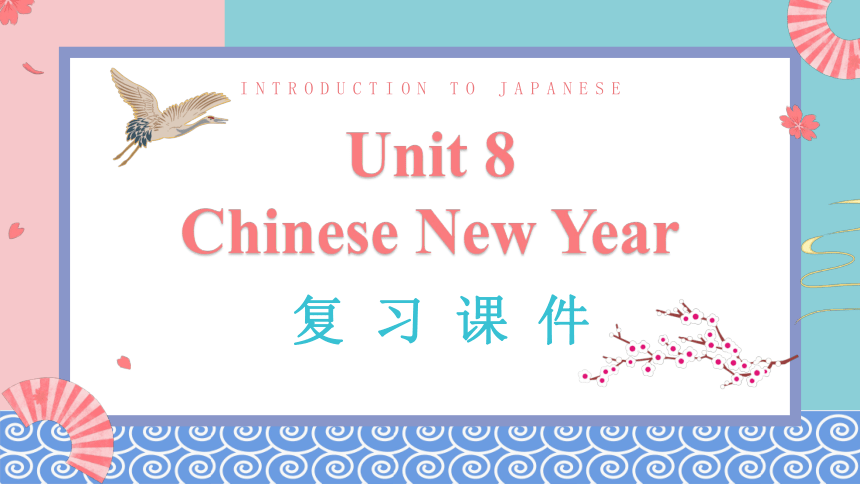 | |
| 格式 | pptx | ||
| 文件大小 | 11.8MB | ||
| 资源类型 | 试卷 | ||
| 版本资源 | 牛津译林版 | ||
| 科目 | 英语 | ||
| 更新时间 | 2023-12-14 20:26:17 | ||
图片预览

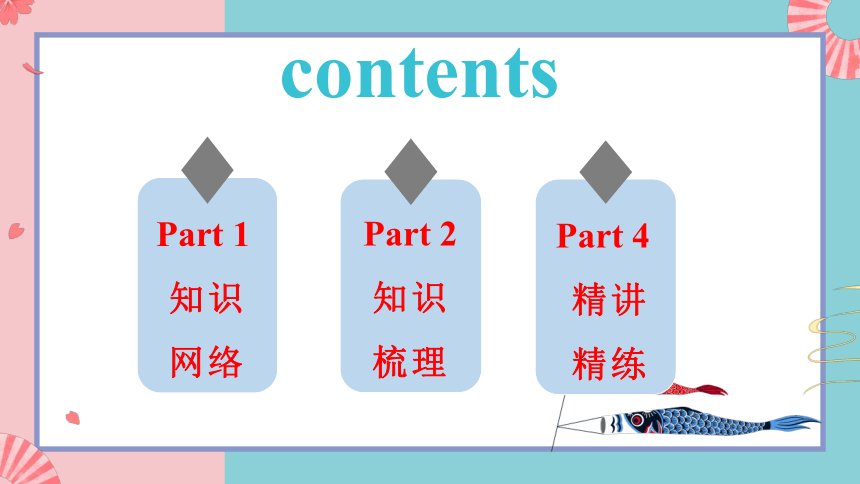
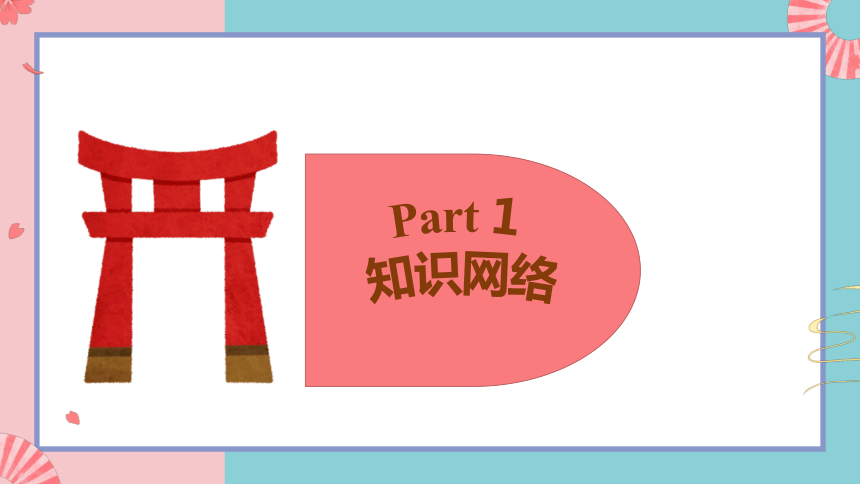
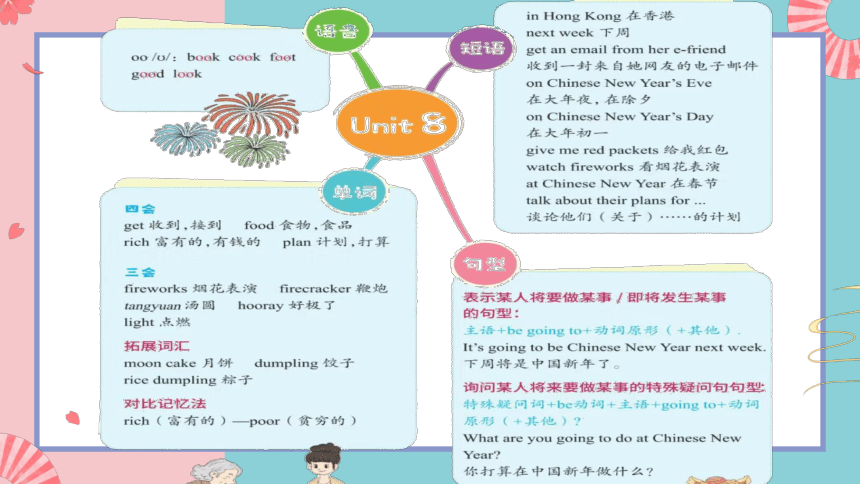

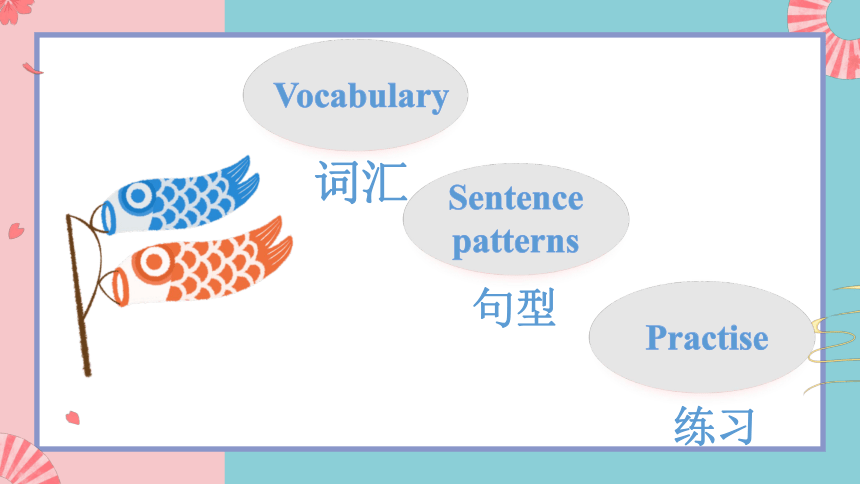
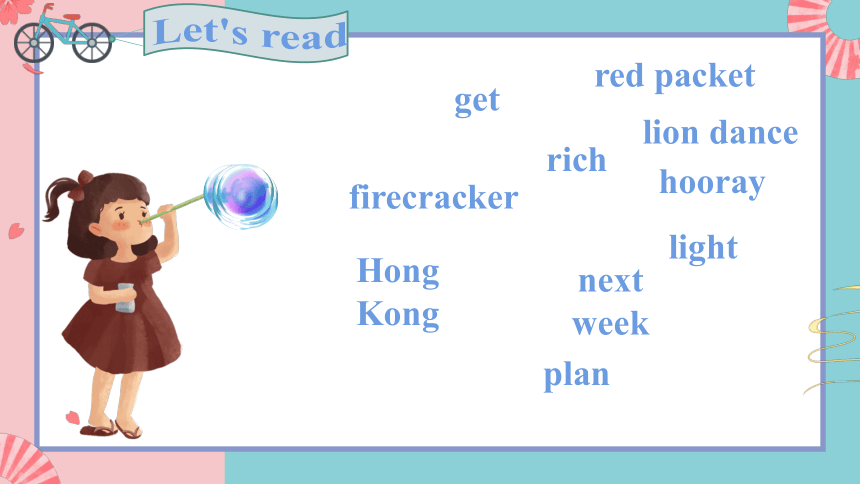



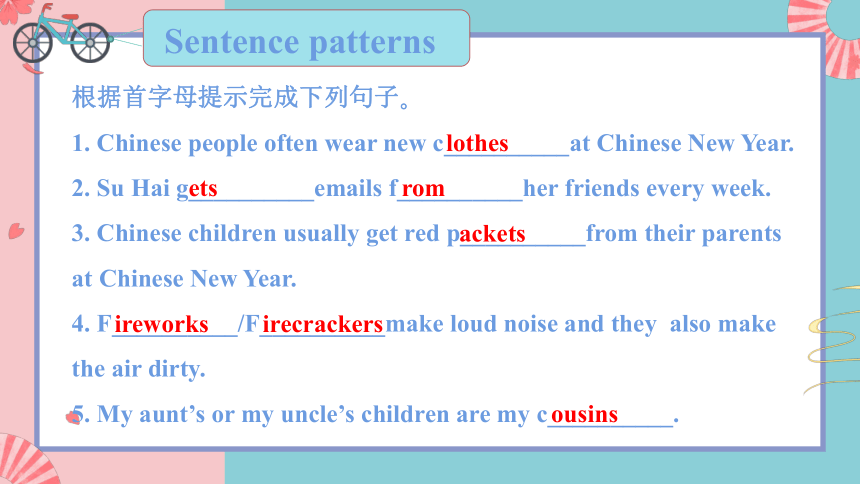
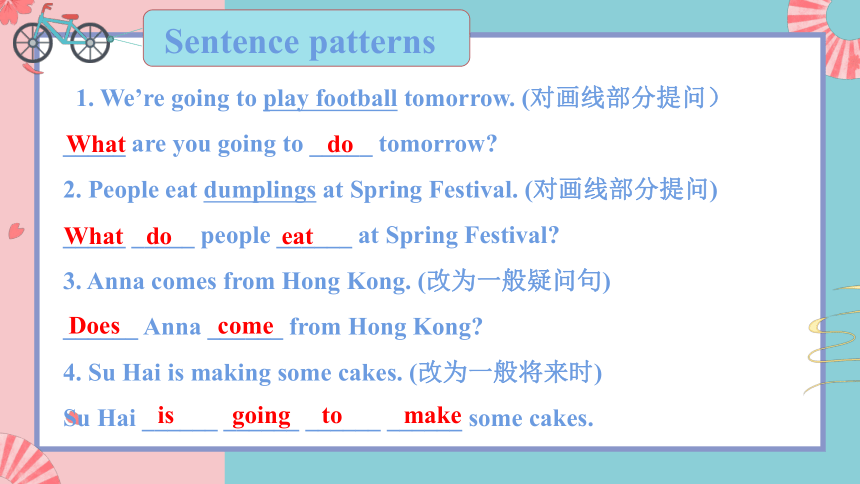
文档简介
(共30张PPT)
INTRODUCTION TO JAPANESE
Unit 8
Chinese New Year
复习课件
contents
Part 1
知识网络
Part 2
知识梳理
Part 4
精讲精练
Part 1
知识网络
Part 2
知识梳理
Vocabulary
Sentence
patterns
Practise
词汇
句型
练习
Let's read
red packet
get
rich
Hong Kong
lion dance
light
hooray
next week
firecracker
plan
一、选择括号内划线部分发音相同的单词并用其正确形式填空。
1.--What is the _________ about -- About _________ .
(football, book, food, good)
2.My _________ is good at _________ . (father, Art, Maths, glass)
3.________ is a fat _________ under the _________ tree.
(here, there, pear, bear)
4.The _________ in a red _________ is a _________ .
(nurse, doctor, girl, skirt)
bear
nurse
pear
skirt
girl
Art
There
book
father
football
读一读,选一选
用所给单词的适当形式填空。
1.Chinese New Year is _________(come) soon.
I feel _________ (excited).
2.Mike _________ (get) an email from his e - friend Jack yesterday.
3.His family _________ (be) going to have a big party together.
4. The sun comes out. Look! They are _________ (get) happy now.
5. ---What holiday _________ (come)after Halloween -- Christmas.
coming
excited
got
is
getting
comes
英汉互译
1.下个星期 2.制作一些汤圆__________________
3.大年初一
4.买一些花 __________________
5.观看一场舞狮表演
6.send an email __________________7.watch fireworks
8.give me some packets __________________
9.buy some new clothes and food__________________
10.have dinner with my family __________________
next week
make some tangyuan
发送一封邮件
the Chine se New Year’s Day
watch a lion dance
看烟花
buy some flowers
给我一些红包
买一些新衣服和食物
和我的家人吃饭
Sentence patterns
根据首字母提示完成下列句子
1. Chinese people often wear new c__________at Chinese New Year.
2. Su Hai g__________emails f__________her friends every week.
3. Chinese children usually get red p__________from their parents at Chinese New Year.
4. F__________/F__________make loud noise and they also make the air dirty.
5. My aunt’s or my uncle’s children are my c__________.
lothes
ets
rom
ackets
ireworks
irecrackers
ousins
Sentence patterns
1. We’re going to play football tomorrow. (对画线部分提问)
_____ are you going to _____ tomorrow
2. People eat dumplings at Spring Festival. (对画线部分提问)
_____ _____ people ______ at Spring Festival
3. Anna comes from Hong Kong. (改为一般疑问句)
______ Anna ______ from Hong Kong
4. Su Hai is making some cakes. (改为一般将来时)
Su Hai ______ ______ ______ ______ some cakes.
What
do
What
do
eat
Does
come
is
going
to
make
Part 3
精讲精练
知识点01:原句:Su Hai gets an email from her e-friend Anna in Hong Kong.苏海收到了一封来自她的香港网友安娜的电子邮件。
【语法解析】
1.get 意为“得到”,如果是从某人处得到某物,可以用短语“get sth. from sb.”来表达。
2.in,on,at表示时间的用法
in用于年、月、季节或某一段时间前,也可用于泛指的早上、下午、晚上之前。
on用于具体的某一天或具体的早上、下午、晚上之前。
at用于某个假期期间(不是指具体的某一天)或具体的几点钟之前。
eg:They got to the Bund in the evening.
【牛刀小试】
( )1. _______ a cold morning, I saw Mr Smith walk on Apple Street.
A.In B.On C./
( )2. —What time does he go to school —_______ about 8:15.
A. On B. In C. At
( )3. Children_____gifts ____ Christmas and on their birthdays.
A. get; on B. get; at C. gets; at
B
C
B
知识点02:原句:I’m excited about Chinese New Year too!
我也因新年感到兴奋。
【语法解析】
be excited about意为“对…感谢兴奋”;
excited表示“兴奋的”,指人、物对…感到兴奋
exciting 表示“令人兴奋的;使人激动的”,指人、事、物本身让人兴奋、激动。
【注】:一般情况下,是人做主语用-ed;物做主语用-ing。
eg:He was excited about the news.
He told us an exacting story yesterday.
【牛刀小试】
一、用所给单词的适当形式填空。
1. He was (exciting)about the news.
2. He told us an (excited) story yesterday.
excited
exciting
知识点03:原句:Chinese New Year is coming.
春节马上就要到了。
【语法解析】
(1)现在进行时表将来
现在进行时表将来其形式有:be+doing。be+doing(表示一个在最近按计划或打算要进行的动作)
e.g. She is flying to Beijing tomorrow. 她明天会飞北京。
They are travelling around the world next month. 他们下个月将环游世界。
常涉及现在进行时表将来的动词:come/go/arrive/stay/do/drive/get/have/fly/play/walk等
(2)节日
Spring Festival,New Year通常指阳历的新年,阳历的元旦(1月1日)是New Year’s Day.而农历的大年初一是Chinese New Year’s Day.
【牛刀小试】
一、根据中文提示完成句子。
1. The bus is_______(come).
2. We are________(come).
coming
coming
知识点04:原句:We’re going to make some cakes and tangyuan.
我们将要做一些蛋糕和汤圆。
【语法解析】
(1)make 作”做,制作”
make sth 制作某物 make a kite make a toy car
make sth for sb= make sb sth 为某人制作某物 My mother makes a kite for me.
(2)make 作”使,使得”
make sb/sth+adj 使某人/某物处于某种状态 The news made me happy.
make sb do sth 使某人做某事 The teacher made the noisy boy stand up.
【牛刀小试】
1. Who ________ (make) you happy every day
2. Which ________ (be) good for us
3. What ________ (make) you so angry
makes
is
makes
知识点05:原句:Bobby and Tina are talking about their plans for Chinese New Year’s Day. 波比和蒂娜正在谈论他们关于春节的计划。
【语法解析】
(1) talk 意为“说话;谈话”, talk about …意为“谈论关于……”,
talk about … with …意为“和……谈论关于……(的事情)”。
(2)句中的 plan 用作名词,意为“计划,打算”,常与介词for连用,表示“……的计划”。
【例句】(1) You can talk about your work with me.
你可以和我谈论关于你工作的事情。
(2) Do you have any plans for the summer holiday
这个暑假你有什么打算
【牛刀小试】
( )1. My father talked the news my grandfather yesterday.
A. about; with B. to; with C. with; about
( )2. We don't have any plans a trip to Shanghai this summer.
A. to B. on C. for
A
C
知识点06:易混淆 New Year’s Day 与 Chinese New Year
【语法解析】
New Year 通常指阳历的新年,而 Chinese New Year 则为中国农历新年,此外Chinese New Year 也可以叫作“Spring Festival”。阳历的元旦(1月1日)是 New Year’s Day, 而农历的大年初一叫作“Chinese New Year’s Day”。
【牛刀小试】
从方框中选择合适的短语填空。
Chinese New Year New Year’s Day
(1) is on the first of January.
(2) is also called“Spring Festival”.
New Year’s Day
Chinese New Year
知识点07:一般将来时be going to...
【语法解析】
1.一般将来时的定义
一般将来时表示将要发生的动作或存在的状态,打算、计划要做的事情,也表示将要发生的事情,
2.表示将来的时间状语:tomorrow,next week,next year,a few days later,soon等。
3.一般将来时的结构:be going to用于表达将要发生的事情或动作
含有be going to的一般将来时的各句式的句型结构:
(1)肯定句: 主语 + be going to + 动词原形 (+其他).
(2)否定句: 主语 + be not going to + 动词原形 (+其他).
(3)一般疑问句: Be + 主语 + going to + 动词原形 (+其他)
肯定回答:Yes, 主语 + be动词. 否定回答:No, 主语 + be not.
(4)特殊疑问句: 特殊疑问词 + be动词 + 主语 + going to + 动词原形 + (其他)
例如: He is going to play football tomorrow. 他明天打算踢足球。
【牛刀小试】
用所给词的适当形式填空。
1. What is Helen going ____________ (buy) at Christmas
2. We’re going to ____________ (make) cakes tomorrow.
3. Who ____________ (be) going to Hong Kong next week
to buy
make
is
知识点08:字母组合“oo”的发音
【语法解析】
总结:字母组合oo在k前,w后以及good, foot, stood中发短音/u/
拓展:字母组合oo在这里发长音/u:/,如:school,afternoon
字母组合oo还可以发/ /,如:blood, flood
【牛刀小试】
从下列每组单词中选出画线部分读音不同的一项。
( )1.A.book B.foot C.cool D.cook
( )2.A.good B.noon C.bedroom D.moon
C
A
Thank you
INTRODUCTION TO JAPANESE
Unit 8
Chinese New Year
复习课件
contents
Part 1
知识网络
Part 2
知识梳理
Part 4
精讲精练
Part 1
知识网络
Part 2
知识梳理
Vocabulary
Sentence
patterns
Practise
词汇
句型
练习
Let's read
red packet
get
rich
Hong Kong
lion dance
light
hooray
next week
firecracker
plan
一、选择括号内划线部分发音相同的单词并用其正确形式填空。
1.--What is the _________ about -- About _________ .
(football, book, food, good)
2.My _________ is good at _________ . (father, Art, Maths, glass)
3.________ is a fat _________ under the _________ tree.
(here, there, pear, bear)
4.The _________ in a red _________ is a _________ .
(nurse, doctor, girl, skirt)
bear
nurse
pear
skirt
girl
Art
There
book
father
football
读一读,选一选
用所给单词的适当形式填空。
1.Chinese New Year is _________(come) soon.
I feel _________ (excited).
2.Mike _________ (get) an email from his e - friend Jack yesterday.
3.His family _________ (be) going to have a big party together.
4. The sun comes out. Look! They are _________ (get) happy now.
5. ---What holiday _________ (come)after Halloween -- Christmas.
coming
excited
got
is
getting
comes
英汉互译
1.下个星期 2.制作一些汤圆__________________
3.大年初一
4.买一些花 __________________
5.观看一场舞狮表演
6.send an email __________________7.watch fireworks
8.give me some packets __________________
9.buy some new clothes and food__________________
10.have dinner with my family __________________
next week
make some tangyuan
发送一封邮件
the Chine se New Year’s Day
watch a lion dance
看烟花
buy some flowers
给我一些红包
买一些新衣服和食物
和我的家人吃饭
Sentence patterns
根据首字母提示完成下列句子
1. Chinese people often wear new c__________at Chinese New Year.
2. Su Hai g__________emails f__________her friends every week.
3. Chinese children usually get red p__________from their parents at Chinese New Year.
4. F__________/F__________make loud noise and they also make the air dirty.
5. My aunt’s or my uncle’s children are my c__________.
lothes
ets
rom
ackets
ireworks
irecrackers
ousins
Sentence patterns
1. We’re going to play football tomorrow. (对画线部分提问)
_____ are you going to _____ tomorrow
2. People eat dumplings at Spring Festival. (对画线部分提问)
_____ _____ people ______ at Spring Festival
3. Anna comes from Hong Kong. (改为一般疑问句)
______ Anna ______ from Hong Kong
4. Su Hai is making some cakes. (改为一般将来时)
Su Hai ______ ______ ______ ______ some cakes.
What
do
What
do
eat
Does
come
is
going
to
make
Part 3
精讲精练
知识点01:原句:Su Hai gets an email from her e-friend Anna in Hong Kong.苏海收到了一封来自她的香港网友安娜的电子邮件。
【语法解析】
1.get 意为“得到”,如果是从某人处得到某物,可以用短语“get sth. from sb.”来表达。
2.in,on,at表示时间的用法
in用于年、月、季节或某一段时间前,也可用于泛指的早上、下午、晚上之前。
on用于具体的某一天或具体的早上、下午、晚上之前。
at用于某个假期期间(不是指具体的某一天)或具体的几点钟之前。
eg:They got to the Bund in the evening.
【牛刀小试】
( )1. _______ a cold morning, I saw Mr Smith walk on Apple Street.
A.In B.On C./
( )2. —What time does he go to school —_______ about 8:15.
A. On B. In C. At
( )3. Children_____gifts ____ Christmas and on their birthdays.
A. get; on B. get; at C. gets; at
B
C
B
知识点02:原句:I’m excited about Chinese New Year too!
我也因新年感到兴奋。
【语法解析】
be excited about意为“对…感谢兴奋”;
excited表示“兴奋的”,指人、物对…感到兴奋
exciting 表示“令人兴奋的;使人激动的”,指人、事、物本身让人兴奋、激动。
【注】:一般情况下,是人做主语用-ed;物做主语用-ing。
eg:He was excited about the news.
He told us an exacting story yesterday.
【牛刀小试】
一、用所给单词的适当形式填空。
1. He was (exciting)about the news.
2. He told us an (excited) story yesterday.
excited
exciting
知识点03:原句:Chinese New Year is coming.
春节马上就要到了。
【语法解析】
(1)现在进行时表将来
现在进行时表将来其形式有:be+doing。be+doing(表示一个在最近按计划或打算要进行的动作)
e.g. She is flying to Beijing tomorrow. 她明天会飞北京。
They are travelling around the world next month. 他们下个月将环游世界。
常涉及现在进行时表将来的动词:come/go/arrive/stay/do/drive/get/have/fly/play/walk等
(2)节日
Spring Festival,New Year通常指阳历的新年,阳历的元旦(1月1日)是New Year’s Day.而农历的大年初一是Chinese New Year’s Day.
【牛刀小试】
一、根据中文提示完成句子。
1. The bus is_______(come).
2. We are________(come).
coming
coming
知识点04:原句:We’re going to make some cakes and tangyuan.
我们将要做一些蛋糕和汤圆。
【语法解析】
(1)make 作”做,制作”
make sth 制作某物 make a kite make a toy car
make sth for sb= make sb sth 为某人制作某物 My mother makes a kite for me.
(2)make 作”使,使得”
make sb/sth+adj 使某人/某物处于某种状态 The news made me happy.
make sb do sth 使某人做某事 The teacher made the noisy boy stand up.
【牛刀小试】
1. Who ________ (make) you happy every day
2. Which ________ (be) good for us
3. What ________ (make) you so angry
makes
is
makes
知识点05:原句:Bobby and Tina are talking about their plans for Chinese New Year’s Day. 波比和蒂娜正在谈论他们关于春节的计划。
【语法解析】
(1) talk 意为“说话;谈话”, talk about …意为“谈论关于……”,
talk about … with …意为“和……谈论关于……(的事情)”。
(2)句中的 plan 用作名词,意为“计划,打算”,常与介词for连用,表示“……的计划”。
【例句】(1) You can talk about your work with me.
你可以和我谈论关于你工作的事情。
(2) Do you have any plans for the summer holiday
这个暑假你有什么打算
【牛刀小试】
( )1. My father talked the news my grandfather yesterday.
A. about; with B. to; with C. with; about
( )2. We don't have any plans a trip to Shanghai this summer.
A. to B. on C. for
A
C
知识点06:易混淆 New Year’s Day 与 Chinese New Year
【语法解析】
New Year 通常指阳历的新年,而 Chinese New Year 则为中国农历新年,此外Chinese New Year 也可以叫作“Spring Festival”。阳历的元旦(1月1日)是 New Year’s Day, 而农历的大年初一叫作“Chinese New Year’s Day”。
【牛刀小试】
从方框中选择合适的短语填空。
Chinese New Year New Year’s Day
(1) is on the first of January.
(2) is also called“Spring Festival”.
New Year’s Day
Chinese New Year
知识点07:一般将来时be going to...
【语法解析】
1.一般将来时的定义
一般将来时表示将要发生的动作或存在的状态,打算、计划要做的事情,也表示将要发生的事情,
2.表示将来的时间状语:tomorrow,next week,next year,a few days later,soon等。
3.一般将来时的结构:be going to用于表达将要发生的事情或动作
含有be going to的一般将来时的各句式的句型结构:
(1)肯定句: 主语 + be going to + 动词原形 (+其他).
(2)否定句: 主语 + be not going to + 动词原形 (+其他).
(3)一般疑问句: Be + 主语 + going to + 动词原形 (+其他)
肯定回答:Yes, 主语 + be动词. 否定回答:No, 主语 + be not.
(4)特殊疑问句: 特殊疑问词 + be动词 + 主语 + going to + 动词原形 + (其他)
例如: He is going to play football tomorrow. 他明天打算踢足球。
【牛刀小试】
用所给词的适当形式填空。
1. What is Helen going ____________ (buy) at Christmas
2. We’re going to ____________ (make) cakes tomorrow.
3. Who ____________ (be) going to Hong Kong next week
to buy
make
is
知识点08:字母组合“oo”的发音
【语法解析】
总结:字母组合oo在k前,w后以及good, foot, stood中发短音/u/
拓展:字母组合oo在这里发长音/u:/,如:school,afternoon
字母组合oo还可以发/ /,如:blood, flood
【牛刀小试】
从下列每组单词中选出画线部分读音不同的一项。
( )1.A.book B.foot C.cool D.cook
( )2.A.good B.noon C.bedroom D.moon
C
A
Thank you
